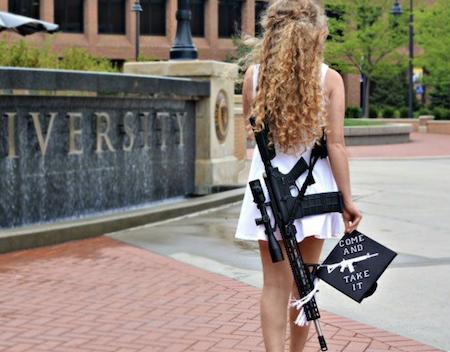Gun As Part of the American Wardrobe
My gun commands a room like a bombshell
red lipstick, compact inside a purse or tucked
in a jean pocket. Maybe she’s born with it,
but maybe it’s my gun. It sparkles like
a backward belt buckle saying Don’t Mess
With My Backside, don’t tell me how to
live my life. Accidentally, I leave my gun
in a bathroom stall while taking a leak.
Can you GPS my gun? Can you microchip
my kids? My gun helps me to see—I buy
them all online, it’s much cheaper and convenient.
I input a slip of information only obtained
by a professional. I help a man on the street who says
he lost his car. We both study a map on my phone,
zoom in and out with my fingers. I never leave home
without my phone. He might have a gun. He says,
tattoo parlor and I sleuth the case, solve the sudden
interruption and sigh that no one’s complimented my stylish
firearm. When I get dressed, it goes: underwear, bra,
shirt, gun, pants. Necklace, sunnies, socks, shoes. It’s not normal
to navigate this territory naked. No one can take away
my right to dress this way. At night, my gun is my other
pillow. It’s the long johns I wear in colder weather, my bling-up
over drab basics as ingrained as a freckle. Even models parade
the runway in designer guns. Critics note the fabrics
of untenable blood over our hands. In articles, they call it art.
Charlotte Seley is a poet, writer, and editor from the Hudson Valley region of New York, currently residing in Kansas City with her cat, Lord Byron. She is the author of The World is My Rival (2018, Spuyten Duyvil) and the chapbook Die Young: Letters to Ke$ha (2019, dancing girl press). Her work can be found in Barrelhouse, Wax Nine Journal, LEVELER, Passages North, Rattle, Glass: A Journal of Poetry, and others. Find her online at charlotteseley.com.
Cherry Tree appears under the imprint of the Literary House Press, the publishing arm of the Rose O’Neill Literary House, a cultural center with an almost 50-year-history of promoting the arts. Washington College undergraduates participate in all facets of the production of this print journal, though professional writers serve as genre editors and fill most senior reader positions. Although the journal is still growing, Cherry Tree has already received national recognition. Poems from three of its six issues have been selected for inclusion in The Best American Poetry (2016, 2017, and 2020). Poems have been reprinted on Poetry Daily and Verse Daily and have appeared in the Orison Anthology. Prose has been listed as “notable” in Best American Essays and appeared in Best Microfictions (2020).



Write a Letter to the Editor on this Article
We encourage readers to offer their point of view on this article by submitting the following form. Editing is sometimes necessary and is done at the discretion of the editorial staff.